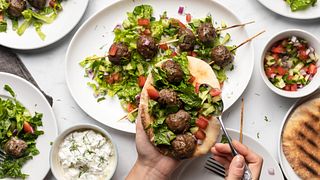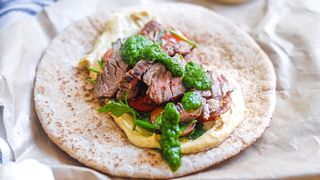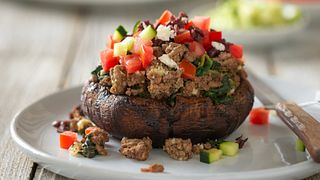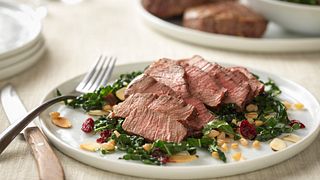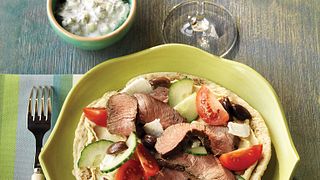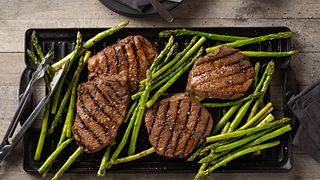Beef In a Mediterranean Diet
"When you are trying to improve your health and eating patterns, there's a place for every food, including beef. Using appropriate portions, choosing leaner beef cuts, and surrounding beef with plenty of whole grains, vegetables, fruits, nuts/seeds and olive oil can help boost the overall quality of nutrients in one’s diet." - Kim Larson, RDN, NBC-HWC, owner of Total Health
beEf As Part of a MeDItErranean Eating style
New research in the American Journal of Clinical Nutrition shows that lean red meat can support heart health when it’s included in a Mediterranean-style eating pattern. The Mediterranean style of eating is one of the healthiest ways to eat in the world. This is great news for people who enjoy beef and are interested in preventing heart disease and improving overall health.
"I recommend the Mediterranean-style eating pattern to many of my clients because it focuses on vegetables, fruits, lean proteins and whole grains in delicious and satisfying combinations that are great for kids and adults." - Kim Larson, RDN, NBC-HWC, owner of Total Health
Getting to the Meat of the Mediterranean Diet:
The Mediterranean diet is one of the most popular eating patterns. It is often described as being rich in fruits, vegetables, whole grains, nuts/seeds and olive oil, and lower in sweets, sodium and red meat. Interestingly, many Mediterranean countries eat about the same amount of red meat, or more, as the United States, but those countries pair red meat with more fresh vegetables and fruits, whole grains and healthy oils.
Recent research from Wayne Campbell, PhD at Purdue University asked if the overall health benefits and long-term heart health benefits long-known to be part of Mediterranean-style eating pattern could be achieved while including lean red meat. This published study shows that, YES, a Mediterranean-style eating pattern that includes fresh, lean red meat can support heart health. The study demonstrates that following a Mediterranean-style eating pattern that includes up to 18 ounces of cooked, fresh lean beef and pork per week – along with poultry and fish – is just as effective at improving certain heart disease risk factors (such as blood pressure and total and LDL cholesterol) as a Mediterranean-style eating pattern that limits red meat. Read the published study recap here.
More research shows that following a Mediterranean-style dietary pattern that incorporates up to 18 oz of fresh lean red meat (beef and pork tenderloin) per week may reduce heart disease risk factors, such as total and LDL cholesterol and blood pressure. Additionally, another study demonstrated that up to 5.5 ounce of lean beef per day in a Mediterranean-style dietary pattern improved blood cholesterol levels.
Beef's Role in the MEDITERRANEAN Diet:
The Mediterranean-style eating pattern encompasses a wide variety of foods and flavors from the countries that surround the Mediterranean Sea. While the cuisines of each country differ slightly, they all have a few things in common. To build a healthy Mediterranean plate:
- Start by filling half your plate with fresh vegetables and fruits.
- Fill in the other half of your plate with lean protein and whole grains.
- Add dairy and healthy fats.
- Include these types of foods regularly and explore more Mediterranean flavors and food options:
Vegetables
Artichokes, Arugula, Beans, Beets, Broccoli, Brussels Sprouts, Carrots, Eggplant, Fennel, Kale, Leeks, Mushrooms, Mustard Greens, Onions, Radishes, Peas, Peppers, Potatoes, Pumpkin, Spinach.
Fruits
Apricots, Cherries, Dates, Figs, Grapes, Oranges, Melons, Pears, Pomegranates, Strawberries, Tomatoes.
Proteins
Lean Beef, Lean Pork, Lean Poultry, Fish/Seafood, Whole Eggs, Soy, Dried Lentils, Dried Beans and Dried Peas.
WHole Grains
Breads, Barley, Bulgur, Couscous, Farro, Oats, Polenta, Brown Rice.
Dairy
Cheese (Brie, Goat, Feta, Mozzarella, Parmigiano-Reggiano, Pecorino, Ricotta), Yogurt, Milk.
Fats
Olives, Olive Oil, Avocado, Nuts & Seeds.
Mediterranean Beef Meal Ideas:
As a Registered Dietitian Nutritionist and Board-Certified Health & Wellness Coach, Kim is passionate about the link between food and health. Her expertise is in helping people live longer, healthier and happier lives.
Kim is a lover of food and nutrition science, and a great resource for anyone looking to live life to its fullest. Visit TotalHealthRD.com to learn more about how Kim can coach you towards your health and wellness goals.
Kim has studied the research and seen the health results for her clients who follow the Mediterranean-style eating pattern. Read her February 2019 article on how this diet focuses on high-quality, nutrient-rich foods.
